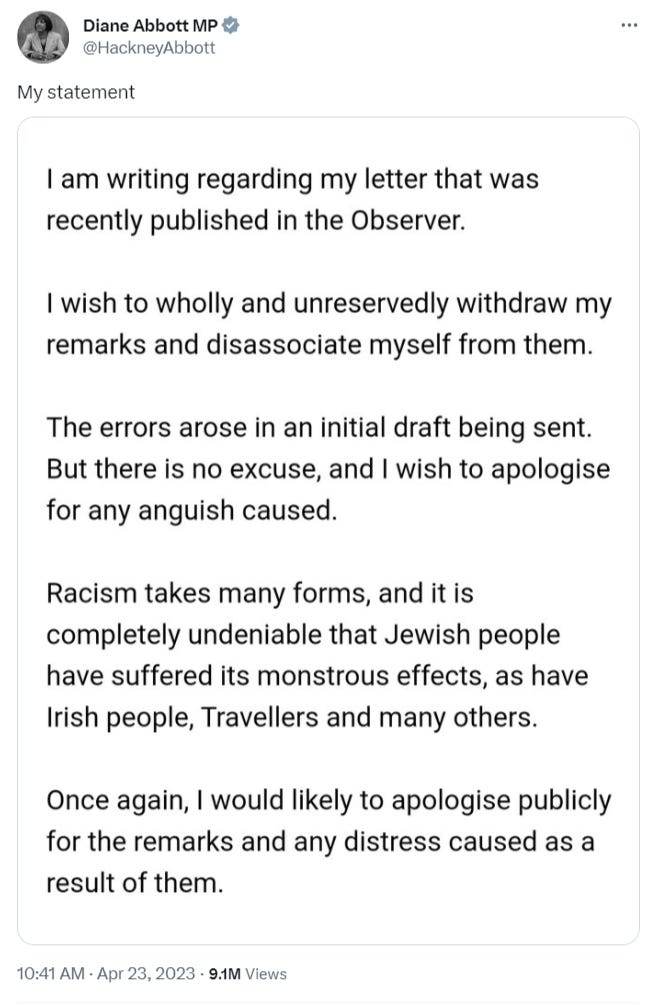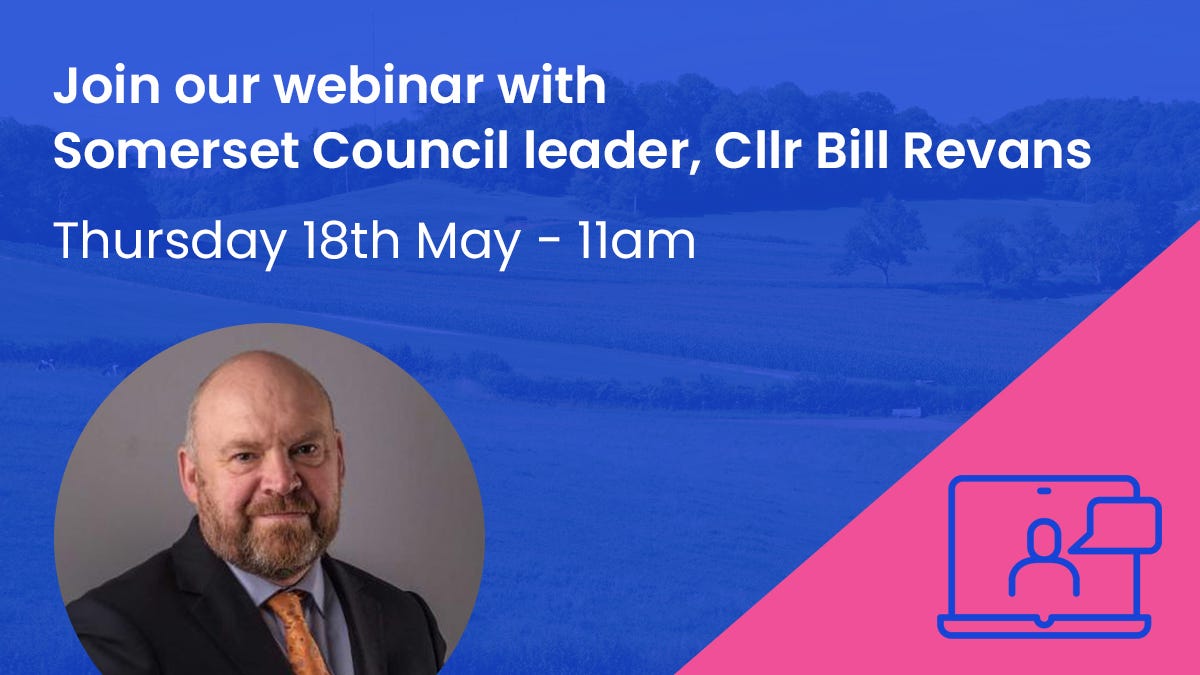Distinctive Dispatch #3: Better comms for people, places and work
Saying sorry in a crisis; local election results; join our discussion with Somerset Council's leader; future of the office; Bristol's Grosvenor Hotel; growth in the West of England.
Thanks for signing up to receive this newsletter, which we publish on the first Friday of the month. We hope you find it interesting. If there are any comms-related matters you’d like us to explore in future newsletters drop us an email or let us know on the chat.
The hard truth about apologies: your reputation rests on them
However tough it is, saying sorry for a mistake is the right thing to do.
When things go wrong, a timely genuine apology can repair reputational damage and restore trust.
It helps if the words are heartfelt and backed up by a commitment to put things right. Comms professionals sometimes describe this as ‘owning a crisis’.
Being sincere. Taking ownership. Committing to putting things right. Learning lessons. We hail these as the steps to reputational redemption, whatever the problem.
But, as we’ve witnessed recently, reality and personality can get in the way of a textbook approach. April saw a spate of missteps followed by apologies, with varying degrees of success. In sharing these examples, we offer no comment on the events which led to the apologies. They speak for themselves and generated miles of copy already.
This is all about the contrition, and how it went down.
The good, the bad, and the non-existent
We start with former Justice Secretary Dominic Rabb’s combative response to the findings of an investigation into allegations that he bullied civil servants across three departments.
The investigation upheld two claims against him, also finding Mr Raab in breach of the Ministerial Code. His resignation letter and subsequent interviews bore little sense of regret from someone just forced out of office by an investigation they called for.
This is a great example of a ‘non-apology apology’. It says he’s ‘genuinely sorry’ while criticising complainants and warning of a ‘chilling effect’ on the public. While some media reported his departure from office sympathetically, the lack of contrition in his statements is striking and left him open to criticism.
Contrast this with Labour MP Dianne Abbott’s apology following her letter in The Observer, which stated that groups including Irish, Jewish, and Traveller people experience prejudice, but are not ‘all their lives subject to racism.’
It’s apologetic and it seeks to own the issue. It also raises questions about that initial draft the statement refers to, and how this could find its way to The Observer. And it makes no commitment to repair damage done.
Then, last week, cartoonist Martin Rowson issued a lengthy personal apology for his piece in The Guardian following BBC Chairman Richard Sharp’s resignation. It stands out from many others that neither own nor even apologise for the failing to which they refer.
Why ‘sorry’ isn’t easy
We’ll never know the full background to events that place people in the eye of a storm. And it’s easier to advise on how to respond than it is to ‘own’ the problem when one’s neck is on the line.
We increasingly see, however, that responding to high profile issues takes careful and empathetic handling. Those in the spotlight should consider taking a step back from legalistic phrases which guard against saying anything that hints at liability. This can lead to the ridiculous “I’m sorry if people felt aggrieved…” non apology.
And there remains a strong viewpoint that organisations can spin their way out of a crisis. Prepare a statement, stick to the agreed lines and all will be fine, it’s argued. How can we learn from failings if we’re not even prepared to acknowledge them?
Saying sorry when things go wrong is hard. Openness, transparency and commitment to learn and put things right would give damaged reputations a fighting chance of recovering.
Look beyond the next day’s headlines, and it’s clearly the right thing to do.
Change ahead for South West councils
Are you interested in this year’s council elections? Many district and unitary councils await the outcome of yesterday’s (4 May 2023) local votes as this newsletter is published.
From what we’ve seen so far, it seems nationally as if the Conservatives have fared badly, while othes can lay some claim to success. In our patch, we see:
Labour take control of Plymouth Council with a 45 per cent share of the vote.
Liberal Democrats retain Bath and North East Somerset.
Conservatives lose overall control of South Gloucestershire Council. It looks like Labour and Lib Dem members are meeting to discuss how to work together to run the authority, with the Conservatives in opposition as the largest political group.
We’re looking closely at areas where our clients are active so we can keep them updated. If you’re interested in what’s happening in the South West or further afield, drop us a line.
Join our Distinctive Discussion with Somerset Council leader
We’re less than two weeks away from our next webinar with Somerset Council leader Bill Revans.
There are spots available to those who want to find out more about the newly created council’s priorities.
Attendees can ask questions and find out more about how the council aims to support successful places and a sustainable economy in the South West.
You’re very welcome to join us at 11am on 18 May.
Things we’ve read
The Nowhere Office: by Julia Hobsbawm: Hobsbawm charts the evolution of office life from the 1930s, through co-working and to today’s hybrid phase. It’s based on interviews with business leaders (including some people I’m lucky to know) and sets a challenge for leaders and employees to reshape work to meet be the best they can be in 2023. The office isn’t dead, but it needs to change to meet the needs of those who use it. I’m looking forward to hearing Julia speak about this in a discussion I’m attending later this year.
Help! I’m trapped in a 15-minute city: Ysenda Maxtone Graham’s piece n The Spectator takes us back to a theme we’ve covered in previous newsletters. It highlights pain points that need addressing as we move to new ways of living, working, travelling and buying things.
Things we’ve said
‘It’s sad, but right, to say goodbye to the Grosvenor Hotel’: Our Bristol 24/7 comment piece responded to news that one of the city’s most notorious eyesores is to be demolished after decades standing empty. It caused quite a debate and was one of the website’s most read articles for the best part of a week. We look forward to seeing what comes next!
Written by Ben Lowndes
World Earth Day – how South West businesses are investing in our planet: This blog post looks at how our clients and ourselves are responding to the climate crisis. We’re fortunate to work with clients who take this seriously. Working to become a Net Zero business is a priority for 2023.
Written by Jasmine Gordon
Growth that works for everyone: the test for West of England's economy: We were delighted to cover the Realising Regional Growth event hosted by Business West and Centre for Cities in Bristol on 27 April. This piece covers headlines from the discussion. Featuring Bristol mayor Marvin Rees, University of Bristol’s Vice Chancellor Evelyn Welch, chairman of the West of England LEP Richard Bonner and Legal & General’s Director of Levelling Up John Godfrey.
Written by Ben Lowndes
Enjoy the bank holiday weekend. See you again on the first Friday in June. If you’d like to share or discuss anything before the next edition, please leave a comment or drop us a line.







